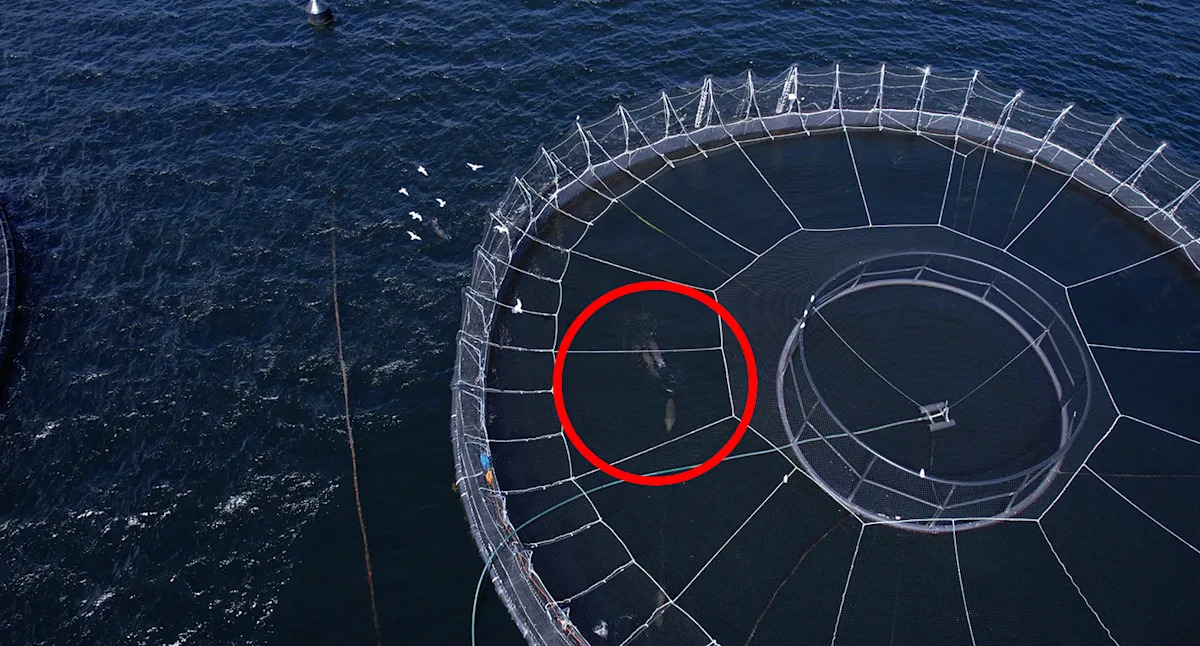Drone footage has sparked momentary panic after five seals were spotted inside sea pens used to breed salmon. The vision, taken by Tasmanian conservationists from Bob Brown Foundation, has escalated a war of words with the fish farm’s Canadian-owned operator, Tassal.
The video was shared two months after it was revealed a seal had died in one of the company’s floating pens after it was shot multiple times with sedation darts, an incident the Foundation said would “not pass the pub test” with everyday Aussies.
Salmon are not native to Australia, so to keep them from escaping into the wild, they’re raised in large floating farms off the coast of Tasmania.
But the waters south of Hobart are also the homeland of native species, like seals, cormorants and dolphins, which venture inside, hoping to find an easy meal.
“This footage shows the inherent cruelty and risk these fish farms cause for native wildlife,” the Foundation’s marine campaigner Alistair Allan said.
Related: Farmed salmon called into question – so is it safe to eat?
Why are seals swimming into fish farms?
To force seals out, fish farm operators are permitted to use force, including explosives and bean bag shots, both of which are controversial.
But in the case of the five seals, filmed on Wednesday near Conningham, in the D’Entrecasteaux Channel, Tassal confirmed no deterrants were needed and all five simply left the pens safe.
“Tassal has invested more than $90m in wildlife-exclusion pens with seal breaches decreasing by more than 80 per cent since 2020,” a company spokesperson told Yahoo.
“Despite this, five seals managed to enter a pen yesterday. They have since left safely and the pen infrastructure has been repaired.”
Although no harm came to the animals, the incident highlights the growing tension between activists and the multinational fish farms that operate in Tasmania’s waters, which supply everyone from sushi shops and restaurants to supermarkets like Coles and Woolworths.
Salmon industry accuses activists of putting worker safety at risk
The Foundation’s opposition to the industry has grown after more than a million fish died from a bacterial infection, with large numbers washing up on beaches around Tasmania.
As the industry responded, another operator, Huon, a subsidiary of Brazil’s largest meat producer JBS, was filmed throwing live fish into sealed bins, leading the RSPCA to sever ties with the industry, and drop its welfare accreditation.
And news that a new antibiotic, Florfenicol, has been approved for use in fish farms has further angered the conservationists. Government advice is that anglers no longer fish in areas within 3km of the farms for 21 days after it’s been used, due to concerns about exposure to antibiotic residues.
Speaking generally about activists, Tassal said the increased interest in its operations and unauthorised activity around its pens is becoming disruptive, particularly the use of drones and boats.
“We respectfully suggest activists stop putting at risk the safety of hard working Tasmanians attempting to do their jobs,” a Tassal spokesperson said.
Love Australia’s weird and wonderful environment? 🐊🦘😳 Get our new newsletter showcasing the week’s best stories.


